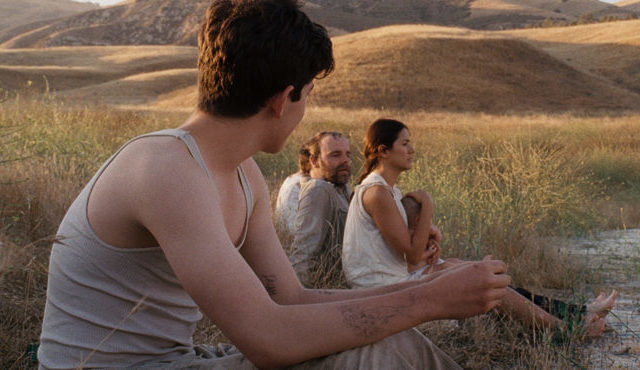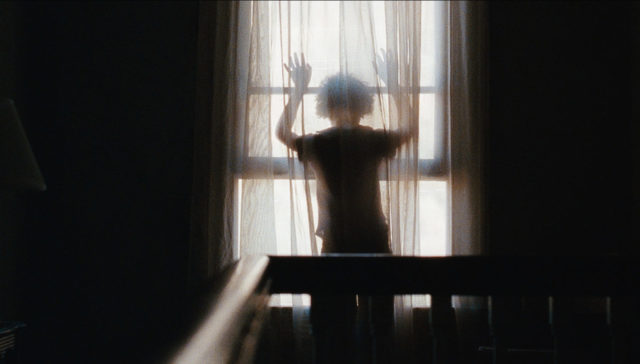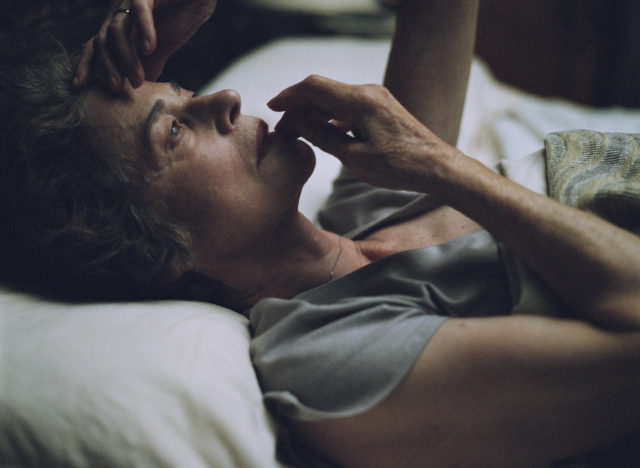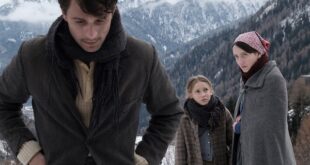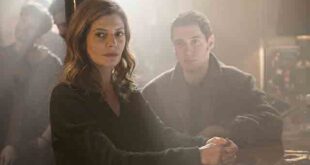Director Andrea Pallaoro’s second feature film has been described as “the intimate portrait of a woman going through an identity crisis.” “Hannah,” starring British actress Charlotte Rampling, premiered in September at the 74th Venice Film Festival, earning a Best Actress prize for Rampling, and is now headed to the Chicago Film Festival.
Pallaoro made his debut in the Orizzonti section of the 2013 Venice Film Festival with “Medeas,” an emotionally heavy drama, which follows members of a family with deep-rooted problems struggling to coexist together under the same roof. It’s a deeply personal film for the spectator because it deals with issues of discontentment, fear, loss of love, disappointment, savoring fleeting moments of joy and living with severe emotional desperation- emotions and situations that we could easily find ourselves in during the course of our lives.. but how we handle these emotions and how the characters handle them are where the film becomes personal. The characters are not judged by their creators and are not presented as bad guys because we see their sides of the story and in some respect, can therefore empathize with their tortured souls. So it’s easy for us to cast judgement while watching them. There are a couple unexpected twists at the beginning of the film and then the ending is a devastating shock. It’s not a joyful, lighthearted film. Instead it’s thought-provoking and sadly reflective of society.
I spoke with Andrea Pallaoro over the phone. I had a lot of questions about his motivation and process of creating his complicated, layered characters. He was articulate and generous with his answers, also revealing that “Hannah” is the first film of a trilogy he is making. We talked a bit about the second installment, another character driven story in which a female character takes the lead, of course with an interesting twist, which seems to be Pallaoro’s signature style.
In the two works you’ve made, I’ve noticed a parallel in the deep introspections of the female characters. Can you speak to creating these two powerful characters?
I’ve always been very interested in female characters. I find their complexities very interesting. That being said, I’m also very interested in characters that are often misunderstood, characters that are going through a complex, internal struggle with themselves. In the case of “Hannah,” Hannah is a woman trapped by her own sense of loyalty and devotion towards her husband. She is paralyzed by her insecurities and dependencies. She’s a woman who is struggling to understand who she is, to understand her identity. It’s a film that really explores the inner torment of the denial of this woman.
Where did the inspiration behind Hannah come from?
Almost always, the inspiration comes from things I see or observe or even things I’m exposed to through the media, and this happened in the same way. But what really started my own inspiration and my own journey with this character, was a single question: What happens after 40 or 50 years, after a life with someone, when you find out information about this person that changes everything? That is a question that both scares me and fascinates me. And that is the situation that Hannah has found herself in.
During the Venice Film Festival, I learned that Charlotte Rampling is very beloved in Italy. She was awarded Best Actress for her portrayal of Hannah. Did you have her in mind when writing this character?
Yes, absolutely. I wrote the film for Charlotte, from the very first word. It has always been a dream of mine to collaborate with Charlotte. I fell in love with her when I was maybe 14 or 15-years-old when I first saw her in “The Damned” by Luchino Visconti. And since then, I’ve followed her through her performances and interpretations of different characters and fell more and more in love with her. So when we found out she wanted to be part of this film, I was absolutely thrilled. I went to meet her in Paris. That meeting marked the beginning of a very important, significant and powerful friendship for me and a great collaboration of course.
It was wonderful to have Charlotte there and to share this experience with her, to have her there so that we could release this film into the world for the first time together. And that is something that I will treasure forever.
Let’s talk about “Medeas.” My first question is about the period or year in which the film is set. That’s something I couldn’t quite figure out.
Yeah, that’s a very good question actually because it is meant to be in a temporal kind of situation, a timeless situation. In my explorations of California- the California desert, I found communities that felt very much outside of time.
Why did you want to tell this story?
I read about an actual story that happened in 2012 and that news clip really resonated with me and pushed me to start a larger research on these actions. For me, it was very important not to vilify or judge these characters but to try to understand their desperation and motivation even in horrific acts like this one. So it was my own need and desire to do that without judging them personally that led me to develop this story and this character study.
The film has an unexpected, strong ending. What were the reactions to the ending when you presented the film around the world?
The audience reaction was different from screening to screening, even person to person. But I also felt grateful for the general response that I got, that they were able to penetrate the internal worlds of these characters, to understand them and to even recognize themselves in the characters. And I feel that is the thing I aspire to the most in cinema- giving the spectator the ability to understand themselves through just observing these characters.
Can you talk to me about your process of writing? Where do you begin to create such a diverse cast of characters? You’re creating men, women and children. How do you get into the heads of these characters and make them so authentic?
For “Medeas” and for “Hannah,” I collaborated with my friend and writing partner Orlando Tirado. What we do is once we identify a subject and a character we want to follow, we start accumulating and gathering images that we both want to see realized cinematically and that are meaningful to us. And once we have a certain amount of these images, of the observations of these characters, we start assembling them together and in the process of placing one next to the other, we discover other images and so forth. For me, what is important in the writing process is that the story, the narrative is never suffocating the characters themselves. And by that, I mean that I want the characters, the exploration of the characters, to lead the narrative and not the other way around where it’s the narrative that leads me to the characters. Because in that way, I feel like that characters are in prison, they’re trapped by the story
Do you have any future projects in the wings?
Yes, I do. I have a project that I can’t wait to start making. It’s called “Monica” and it is part of a trilogy that started with “Hannah.” It’s a trilogy that focuses on female characters. In “Monica,” we follow a transgender woman as she returns home after being absent for over 35 years to take care of her dying mother who has Alzheimer’s. And it was actually her mother who threw her out of the house when she was a 17-year-old boy. It’s going to be a film that explores themes of abandonment and the consequences of abandonment.
Andrea Pallaoro will present his film “Hannah” at the Chicago Film Festival. Please find below the complete schedule of Italian screenings for the Chicago Film Festival. “Medeas” is available through Amazon.
The complete Lineup of Italian Films at the 2017 Chicago Film Festival
INTERNATIONAL COMPETITION
HANNAH
Dir. Andrea Pallaoro
Italy/France/Belgium
When her husband is imprisoned, Hannah (Charlotte Rampling) is left alone with her thoughts as she tries to make sense of his crimes and cope with her newfound loneliness. Saddled with grief, she watches as the life she knew slowly slips from her grasp. Anchored by a quietly ferocious performance from the always captivating Rampling, Hannah is an intimate exploration of character and alienation in the face of family tragedy.
TUE 10/17 6:15 PM
WED 10/18 8:30 PM
THUR 10/19 2:30 PM
WORLD CINEMA CATEGORY
A CIAMBRA
DIRECTOR: JONAS CARPIGNANO
Italy | U.S. | France | Germany
Young Romani Pio lived at the margins of Carpignano’s acclaimed refugee drama Mediterranea—he’s now the focal point of the director’s powerful coming-of-age drama set in the slums of an Italian coastal town. Determined to live up to the outlaw reputation of the older brother he idolizes, the 14-year-old seeks to prove himself a full-grown hustler. An empathetic portrait of a boy, on the cusp of adulthood, who must decide what kind of man he wants to be. Italian with subtitles. 120 min.
SUN 10/15 5:15 PM
MON 10/16 8:45 PM
FORTUNATA
DIRECTOR: SERGIO CASTELLITTO
Italy
On the outskirts of Rome, a hairdresser with dreams of opening her own salon strikes
up an ill-advised affair with her daughter’s therapist. Jasmine Trinca won the acting prize in Cannes’ Un Certain Regard section for her winning portrayal of a working-class single mother determined to live life on her own terms and who is unafraid to make mistakes. Italian with subtitles. 103 min
FRI 10/13 5:45 PM
SUN 10/15 2:45 PM
MON 10/16 1:00 PM
SPOTLIGHT: INTERNATIONAL FILM NOIR
SICILIAN GHOST STORY
DIRECTORS: FABIO GRASSADONIA, ANTONIO PIAZZA
Italy
In a small Sicilian village on the edge of the forest, Giuseppe, a boy of 13, vanishes. Luna, a classmate who loves him, refuses to accept his disappearance. Rebelling against the code of silence and collusion that surrounds them, Luna plunges into the criminal underworld that has swallowed him up. Only their indestructible love can save them both. With its heady fusion of gothic fantasy and Mafia thriller, Sicilian Ghost Story is a unique, atmospheric fable of innocence lost. Italian with subtitles. 120 min.
SUN 10/15 7:30 PM
MON 10/16 5:30 PM
THUR 10/19 3:00 PM
SPECIAL PRESENTATION
BLOW-UP
DIRECTOR: MICHELANGELO ANTONIONI
Italy
More than 50 years after it became an international sensation, Italian master Antonioni’s English-language debut remains an enthralling mystery. David Hemmings
stars as a high-fashion photographer in ’60s London whose camera might have captured a murder during a shoot with an enigmatic beauty (Vanessa Redgrave). From its intoxicating color palette to its dazzling cinematography, Blow-Up remains an art cinema landmark and a sublime time capsule of its countercultural moment. With Vanessa Redgrave in person. 111 min.
TUE 10/17 5:30 PM
CALL ME BY YOUR NAME
DIRECTOR: LUCA GUADAGNINO
Italy | France | Brazil | U.S.
The new film by Guadagnino (I Am Love) is a sensual and transcendent tale of first love. It’s the summer of 1983 in the north of Italy, and Elio (Timothée Chalamet), a precocious 17-year-old, spends his days in his family’s 17th century villa, flirting with his friend Marzia (Esther Garrel). After Oliver (Armie Hammer), a charming American scholar arrives, Elio and Oliver discover the heady beauty of awakening desire. English, Italian, French with subtitles. 130 min.
WED 10/25 8:00 PM
 Fra Noi Embrace Your Inner Italian
Fra Noi Embrace Your Inner Italian


